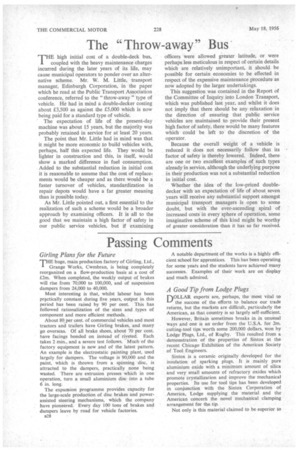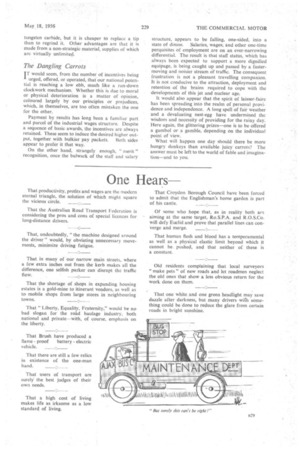Passing Comments
Page 36

Page 37

If you've noticed an error in this article please click here to report it so we can fix it.
Girling Plans for the Future
'THE huge, main production factory of Girling, Ltd., I Grange Works, Cwmbran, is being completely reorganized on a flow-production basis at a cost of £2m. When completed, the weekly output of brakes will rise from 70,000 to 100,000, and of suspension dampers from 24,000 to 40,000.
Most interesting is that, whilst labour has been practically constant during five years, output in this period has been raised by 90 per cent. This has followed rationalization of the sizes and types of component and more efficient methods.
About 80 per cent. of commercial vehicles and most tractors and trailers have Girling brakes, and many go overseas. Of all brake shoes, about 70 per cent. have facings bonded on instead of riveted. Each takes 2 mm., and a severe test follows. Much of the factory equipment is new and of the latest pattern. An example is the electrostatic painting plant, used largely for dampers. The voltage is 90,000 and the paint, which is thrown from a spinning disc, is attracted to the dampers, practically none being wasted. There are extrusion presses which in one operation, turn a small aluminium disc into a tube 6 in. long.
The expansion programme provides capacity for the large-scale production of disc brakes and powerassisted steering mechanisms, which the company have pioneered. Every day 100 tons of brakes and dampers leave by road for vehicle factories.
B28 A notable department of the works is a highly efficient school for apprentices. This has been operating for some years and the students have achieved many successes. Examples of their work are on display and much admired.
A Good Tip from Lodge Plugs
nOLLAR exports are, perhaps, the most vital to the success of the efforts to balance our trade returns, but the markets are difficult, particularly the American, as that country is so largely self-sufficient. However, Britain sometimes breaks in in unusual ways and one is an order from the U.S.A. for 2m. cutting-tool tips worth some 200,000 dollars, won by Lodge Plugs, Ltd., of Rugby. This resulted from a demonstration of the properties of Sintox at the recent Chicago Exhibition of the American Society of Tool Engineers.
Sintox is a ceramic originally developed for the insulation of sparking plugs. It is mainly pure aluminium oxide with a minimum amount of silica and very small amounts of refractory oxides which promote crystallization and improve the mechanical properties. Its use for tool tips has been developed in conjunction with the Sintox Corporation of America, Lodge supplying the material and the American concern the novel mechanical clamping arrangement for the tip.
Not only is this material claimed to be superior to
tungsten carbide, but it is cheaper to replace a tip than to regrind it. Other advantages are that it is made from a non-strategic material, supplies of which are virtually unlimited.
The Dangling Carrots
I T would seem, from the number of incentives being urged, offered, or operated, that our national potential is reaching a low ebb, much like a run-down clockwork mechanism. Whether this is due to moral or physical deterioration is a matter of opinion, coloured largely by our principles or prejudices, which, in themselves, are too often mistaken the one for the other.
Payment by results has long been a familiar part and parcel of the industrial wages structure. Despite a sequence of basic awards, the incentives are always retained. These seem to induce the desired higher output, together with bulkier pay packets. Both sides appear to prefer it that way.
On the other hand, strangely enough, " merit " recognition, once the bulwark of the staff and salary structure, appears to be falling, one-sided, into a state of disuse. Salaries, wages, and other one-time perquisites of employment are on an ever-narrowing differential. The result is that staff status, which has always been expected to support a more dignified equipage, is being caught up and passed by a fastermoving and noisier stream Of traffic. The consequent frustration is not a pleasant travelling companion. It is not conducive to the attraction, deployment and retention of the brains required to cope with the developments of this jet and nuclear age.
It would also appear that the spirit of laisser-faire has been spreading into the realm of personal providence and independence. A long spell of fair weather and a devaluating nest-egg have undermined the wisdom and necessity of providing for the rainy day. Here again, the glittering prizes—one is to be offered a gambol or a gamble, depending on the individual point of view.
What will happen one day should there be more hungry donkeys than available juicy carrots? The answer must be left to the world of fable and imagination—and to you.
















































































































